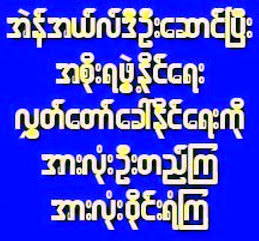- By: ACHARA ASHAYAGACHAT
- Published: 3/07/2009 at 12:00 AM
- Newspaper section: News
United Nations secretary-general Ban Ki-moon's two-day trip to the Burmese administrative capital of Naypyidaw, which begins today, has drawn a mixed reaction and raised many expectations.
His first trip, made three weeks after Cyclone Nargis hit Burma last year, was equally controversial. He was then urged to pressure Burma to speed up its democratisation process in exchange for international humanitarian assistance.
This time round, his July 3-4 visit is being faulted by some as helping to justify the junta's trial of Burma's opposition icon Aung San Suu Kyi.
Critics said the UN chief might be able to return to his office with the freedom of a few political prisoners but not that of the iron lady herself.
Others said his Asian face and diplomatic finesse should help open the isolated mindset of Senior General Than Shwe, chairman of the ruling State Peace and Development Council (SPDC).
Some conducive elements have already been gradually laid down during previous visits by the UN chief's special envoy, Ibrahim Gambari. Burma has also been under pressure from Asean and Thailand as well as China to change.
Given these factors, they believe the SPDC could soften its stance. The junta must also realise patience in the international community is wearing thin and it must show some progress towards democratisation and national reconciliation.
The junta has many domestic problems, especially the country's social and economic meltdown caused by long-time mismanagement and the global financial crisis. There has also been an increase in armed confrontations with several ethnic groups, which refuse to bow to the SPDC's efforts to transform them into border guards to secure border areas before next year's general election.
With rising animosity among the people, the junta's plan to transform smoothly into an elected government might be in danger if a fresh public uprising erupts.
To neutralise armed ethnic groups, the SPDC needs the trusted face of Mrs Suu Kyi to co-chair talks so reconciliation attempts can move forward.
For Mr Ban, nothing would be more acceptable for him than the UN showing its ability to engage more closely with the SPDC to solve the Burma problem.
Bo Hla Tint, an elected MP in the 1991 election from the National League for Democracy (NLD), said Mr Ban's involvement and initiatives have been appreciated. But the secretary-general must make it clear this visit is not window dressing. He needs to show results to help kick-start serious discussion between the junta and the world body.
"It is a crucial crossroads for both the UN and the SPDC. They cannot speak the same words - national reconciliation - with different meanings," said Hla Tint, also foreign minister of the exiled National Coalition Government of the Union of Burma.
Khin Omar, secretary-general of the Forum for Democracy in Burma, said the junta would need to free Mrs Suu Kyi and other political prisoners after Mr Ban's visit.
Without such a move, she said Burma would definitely be seen as closing its doors to the international community's efforts to help resolve its problems.
"If that is the case, the UN Security Council will become an inevitable venue to address the Burma issue," she said.
But many critics remain concerned that opposition members will continue to be barred from participating in politics even if Mrs Suu Kyi and other political prisoners are freed from detention.
"If this is the case, then no one can call the UN secretary-general's visit to Burma a success," one critic said.







No comments:
Post a Comment